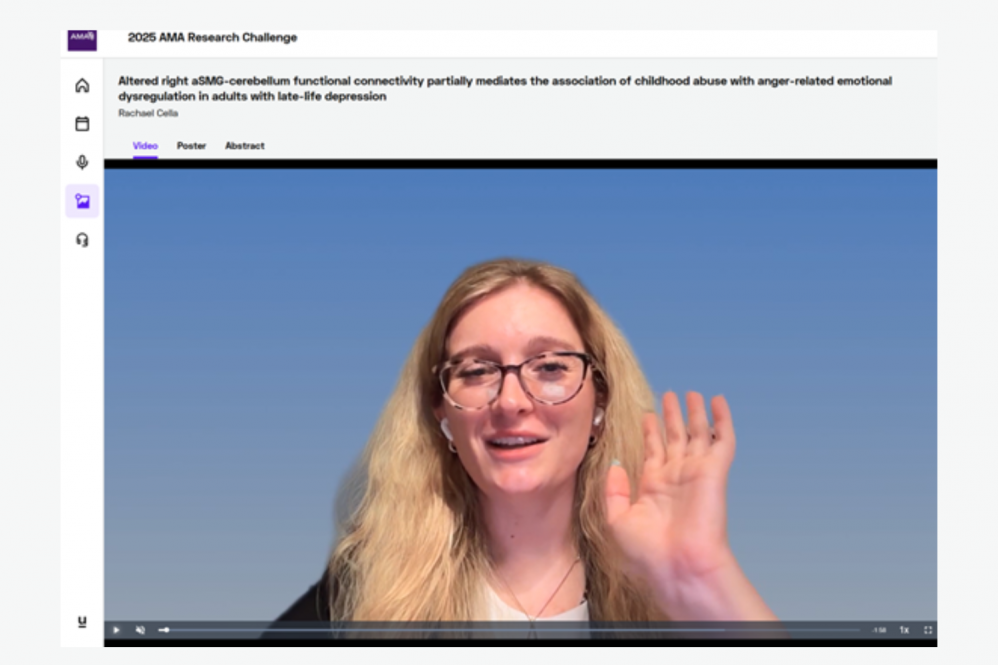The event is the largest national, multi-specialty research event featuring research from 1,000 medical students, residents, fellows, and international medical graduates from over 174 medical schools and more than 150 residency and health care institutions. More than 1,400 abstracts were submitted to the event for consideration in research across six topic areas of basic science, clinical and translational research, clinical vignettes, health systems science, medical education, and public health and health policy.
“I am incredibly proud of our UConn medical students for their outstanding contributions to the 2025 AMA Research Challenge. Their dedication to advancing medical knowledge, their innovative research, and their commitment to improving patient care exemplify the excellence we strive for at the UConn School of Medicine,” said Dr. Melissa Held, senior associate dean of Medical Student Education at UConn. “Their work not only reflects their individual brilliance but also elevates the reputation of our institution on the national stage. Congratulations to each of them!”
Meet UConn’s Student Researchers
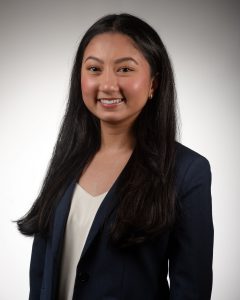
Mehreen Pasha, 25, of Cheshire is currently a research fellow at Rush in Chicago in between her third and fourth year of UConn medical school.
“I’m honored to present my work on sex-based differences in rotator cuff repair on a national platform as prestigious as the American Medical Association,” Pasha shared. “I’m excited to share our findings, engage with other aspiring women in surgery, and contribute to a broader conversation on improving outcomes in orthopedic surgery. I’m grateful to Ronak Mahatme (Class of 2025) and Dr. Kathy Coyner for bringing me on the project and mentoring me!”
The research team studied over 100,000 patients undergoing arthroscopic rotator cuff repair to explore sex-based differences in postoperative outcomes. Their findings showed that women had higher rates of emergency department visits within two weeks after surgery and were more likely to undergo shoulder replacement within two years, while men had higher short-term infection rates.
“Professionally and personally, I am interested in learning more about sex-based differences to see how we can optimize surgical planning and postoperative recovery in orthopedics,” Pasha shares.
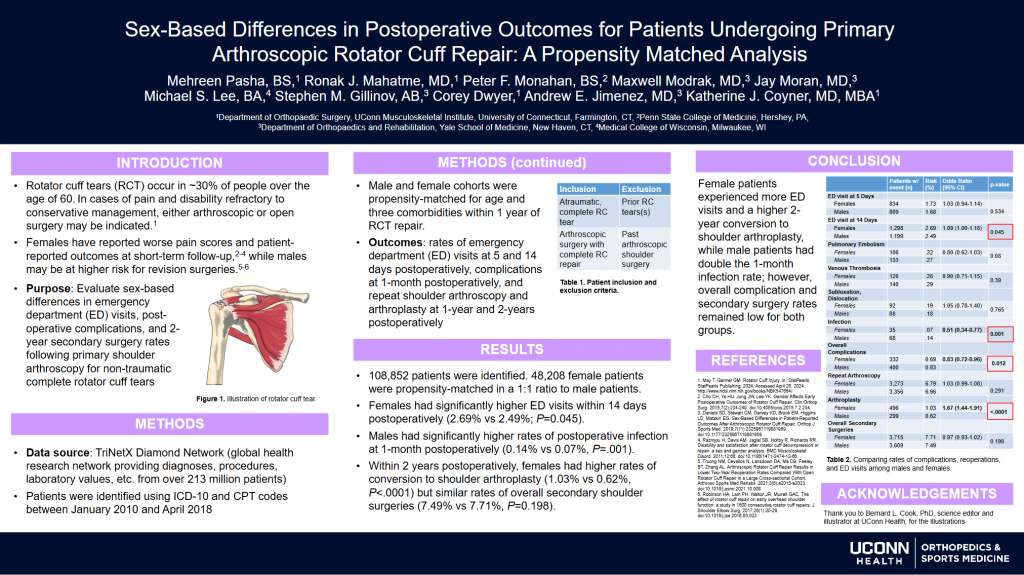
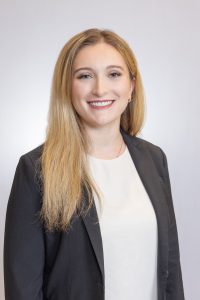
Rachael Cella, 28, of Rocky Hill, is a fourth-year UConn medical student, also currently on a research year. She plans to pursue a career in medicine as a future physician-scientist.
“I feel honored and excited to represent the UConn SOM and show the nation the innovative research we do here. I’m also extremely grateful to have the opportunity to share my work alongside other talented medical students,” Cella shared.
One in four children experience emotional, physical, or sexual abuse, with negative impacts on development that persist into adulthood, including emotion dysregulation and cognitive control issues. Cella and her team’s poster presentation was on childhood abuse and its long-term effects on emotion regulation and brain functional connectivity in late-life depression. The research team found that those reporting childhood abuse had higher levels of anger-hostility, those reporting childhood abuse had increased resting-state functional connectivity between the right supramarginal gyrus and cerebellum, and this increased functional connectivity appears to partially mediate the link between childhood abuse and anger-hostility.
“This work is meaningful to me because it helps illuminate how adverse childhood experience shape the brain across the lifespan and may point toward more targeted treatment strategies,” Cella concludes.
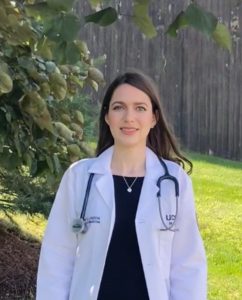
Sabina London, 27, of Haworth, NJ is a second-year medical student at UConn.
“I was really excited to be selected for this event because it gives me the opportunity to showcase my research with other medical students across the country,” shared London.
She presented her poster on research that she conducted at the University of Cambridge in the Department of Psychiatry. She started this work during her MPhil in Translational Biomedical Research and says it has been amazing to see it evolve so much over the past several years. During her MPhil, she predicted patients with dementia that are most at risk of needing intensive psychiatric care.
“Using cognitive, clinical, and demographic variables, I worked with the team of developers to create a prototype of the mobile application that can allow clinicians to identify high-risk patients and facilitate trials of targeted interventions to improve health outcomes,” says London, who loved the opportunity for learning about the work conducted by other students at the event.
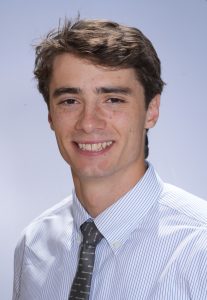
Weston Carpenter, 24, of Ridgefield is a third-year UConn medical student.
“I’m very excited to be presenting research that I’ve done at UConn! I love researching case studies because it’s a way to share a unique or abnormal presentation of a disease process that could potentially aid other providers down the road in recognizing and/or treating that condition,” Carpenter says. “I’m especially fortunate to be able to represent my research team at this AMA research challenge considering everyone worked so hard to gather the necessary information to present this clinical vignette. Infectious disease, orthopedics, and pharmacy all played a role in making this presentation happen.”
His team’s case study presented at the AMA Challenge focused on a very uncommon fungal infection in the knee of an immunocompetent patient that was initially caused by an open wound to his distal thigh. This case is important to present because this presentation is very often overlooked or missed due to its rarity and having another documented case of it can help providers have it in the back of their mind when treating future patients, says Carpenter. “In addition, this patient required the use of an investigational antifungal treatment not yet approved for widespread commercial use, which took specific FDA approval. That also makes this case unique.”
Carpenter also heartwarmingly shared, “I’m most looking forward to being able to see my sister’s sepsis research at this event! She also submitted a poster for this research challenge, which was accepted.”
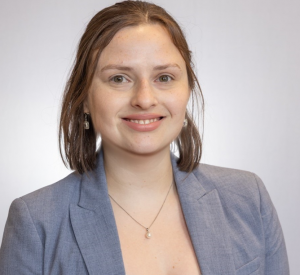
“Getting to learn from others and exchange our research passions,” was the best part of the AMA Challenge event says fourth-year medical student Jessica Munck, 28, of North Branford who was grateful and excited to present her findings.
“I did a case vignette on a case of pseudohypoparathyroidism that I saw during my inpatient pediatrics clerkship. This was the case I used for the required radiology clerkship assignment, and because I thought it was so interesting, I wanted to delve deeper and turn it into a case study,” said Munck of UConn School of Medicine. “I think it is important clinically because it showed how a head CT used to initially evaluate altered mental status in a pediatric patient uncovered brain calcifications, leading to the discovery of severe hypocalcemia and elevated PTH, consistent with a new diagnosis of genetic pseudohypoparathyroidism type 1b with neurologic sequela. It therefore reflects the utility of imaging and lab studies in diagnosing a rare condition with a fairly nonspecific chief complaint.”
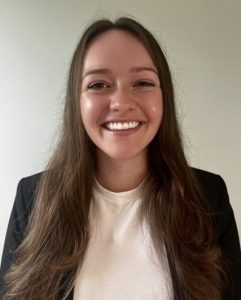
Fourth-year UConn medical student in the Class of 2026, Coline Lynne Redeker, 27, from Larkspur, CO was very excited to share her team’s research and create more discussions about headache treatment in the Emergency Department at the event.
“I am excited to share all our hard work,” shared Redeker after working closely with several UConn faculty and staff including Dr. Regina Kostyun, Aaron Wikle, and Dr. Robert Fuller on the research project for the last two years.
Her research project was a retrospective analysis of patients who presented to the ED with a chief complaint of headache. The team examined the types of pharmacologic treatments patients received and how these were associated with length of stay.
“As there is currently no standardized treatment algorithm for headaches in the ED, identifying more efficient management strategies is crucial—especially given that nearly five million patients present to U.S. emergency departments each year with headache complaints,” Redeker reports. “There is such wide variability in how providers manage headaches, and further research into the most effective treatments will benefit patients and the overall health care system.”
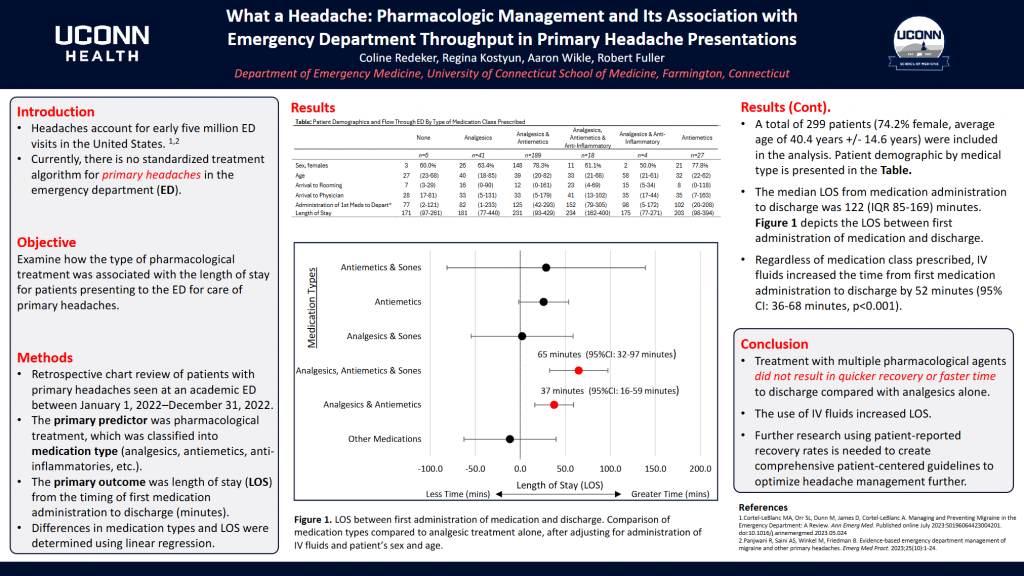
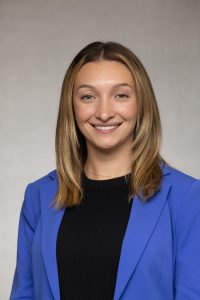
Angela McCarthy, 26, of Glastonbury is a third-year medical student set to graduate in UConn’s Class of 2027.
“I’m honored to represent UConn at the AMA Research Challenge,” shared McCarthy. “The unique format of the AMA Research Challenge is exciting to be part of as the national competition brings together medical students and early career researchers from across the world in a virtual setting.”
Her research project with UConn School of Medicine co-authors Dr. Linda Barry and fellow medical student Tyler Chavers, “Navigating the Artificial Intelligence Era: Student Perspectives and Usage Patterns of Large Language Models in Medical and Dental Education,” explores how students are engaging with AI tools like ChatGPT and presents a three-part framework for integrating AI into medical education. Developed with input from UConn students and faculty, this work emphasizes the importance of teaching future clinicians to both understand and evaluate AI, while avoiding overreliance through intentional curriculum design.
“Our goal is to ensure medical and dental students can leverage the power of AI in their future careers without compromising the fundamental reasoning and problem-solving skills that make a great physician,” says McCarthy.
UConn’s Chelsea Cheriska, 26, of Brooklyn, NY is in her third year, and she feels incredibly honored to represent UConn School of Medicine at the AMA Research Challenge.
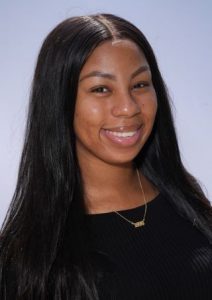
“It’s also deeply meaningful to share research that expresses my interest in global health and addresses disparities in neonatal care,” Cheriska shared who enjoys connecting with other students and residents who share a passion for advancing medical research and patient care.
She presented her research on healthcare providers’ knowledge, attitudes, barriers, and practices regarding therapeutic hypothermia for perinatal asphyxia in the Kisoro and Gulu districts of Uganda.
“This work is important to me because it highlights how global health disparities affect newborn survival and long-term outcomes, including understanding how provider perceptions influence clinical implementation. Personally, it’s rewarding to contribute to research that can educate and raise awareness on sustainable interventions that can potentially save and improve newborn lives.”
Congrats to our UConn medical students and all the AMA Research Challenge presenters.
